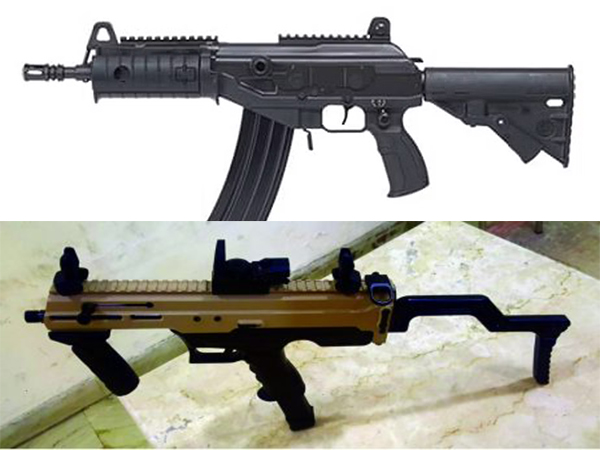
In a significant boost to self-reliance in the defence manufacturing sector, India has cleared purchases worth ₹28,732 crore, including armed drone swarms, carbines and bullet-proof jackets, that will be designed and developed in the country, the defence ministry said on 26 July 2022.
The Defence Acquisition Council (DAC) approved the purchase of around 400,000 close-quarter carbines “to combat the current complex paradigm” of conventional warfare, hybrid warfare and counter-terrorism at the borders, the ministry statement said. An Acceptance of Necessity (AoN) is the first step in any defence procurement process.
The close-quarter carbines will be for front-line soldiers deployed along India’s borders, including the Line of Actual Control (LAC) with China, where the two countries have been locked in a tense standoff since May 2020.
The central government is planning to indigenously manufacture carbine for the army, navy and air force and has currently put its deal with UAE on the side. It is yet another effort by the government to promote the vision of ‘Atmanirbhar Bharat’ and pushing India to gain its foothold in defence manufacturing.
Earlier the Indian army was planning to buy Carbine from the United Arab Emirates (UAE). Keeping it aside for the moment, about 4.2 lakh carbines are to be made in India for the army, navy and air force collectively.
The defence minister was tight-lipped on whether the procurement will be through the ‘Buy Indian’ category or through the Indigenously Designed, Developed and Manufactured (IDDM) route. Initial estimates suggest that the allocation for the project is going to be over Rs 5,000 crore. It is likely that the production of over 4 lakh carbines and their contract will be allotted to two manufacturers from the private or public sector.
Procuring through the Buy Indian category will mean that several foreign companies who either have or will have joint ventures with Indian firms will be participating.
Under Indigenous Design, Development & Manufacture (IDDM), the competition would have been between only three firms, out of which only one would have been a private firm.
The likely calibre requirement will be the 5.56×45 NATO, and not the 5.56×45 INSAS. While the former is the one used globally, the latter is a slightly different calibre used by India for its INSAS series of rifles, which will be replaced by the AK 203. It is learnt that the carbines may be limited to is likely to be a maximum 3.2 kg.
The main companies in contention will be Bengaluru-based private defence firm SSS Defence, PLR of the Adani Group, the Ordnance Factory Board (OFB), Kalyani Group — which has a tie-up with French firm Thales but is also in talks with the Defence Research and Development Organisation (DRDO) — the Jindal Group, which has tied up with a Brazilian firm called Taurus, and Neco Desert Tech, a joint venture between Indian and American firms.
However, if the deal is opened up to non-locally manufactured carbines, then more companies will participate on the condition that they will set up a manufacturing base in India if they bag the contract.
SSS Defence could offer its indigenously built M72 Carbine while PLR is likely to present its Galil Ace. PLR has tied up with Israel Weapon Industries (IWI) and is already manufacturing various small arms in India. The Kalyani Group is likely to tie up with DRDO for the project, while OFB will be offering its own product.
If the competition opens up, the UAE’s state-owned firm Caracal, which had emerged as the lowest bidder for a now-junked fast-track procurement (FTP), will also throw in its hat. While the firm was initially in talks with Reliance Defence for a tie-up, the deal did not go through.
Background
The Army has been trying to acquire the CQB carbines since 2008 to replace its outdated and ageing 9mm British Sterling 1A1 submachine guns that are in service. Both DRDO and OFB had failed to meet the Army’s requirements back then, and a global tender for procurement of 44,618 CQB Carbines was issued in 2011.
While four companies — Israel’s IWI, Italian Beretta, and American firms Colt and Sig Sauer — participated, only IWI qualified as the other contenders could not meet the qualitative requirements pertaining to the night vision mounting system.
But the defence ministry did not go ahead with IWI because it had become a single vendor case, which, according to the government’s procurement manual, is not allowed.
In 2017, a global RFI — a process initiated to gather information on what is available in the market — was issued for the purchase of 2 lakh carbines, while a separate process was rolled out to procure 93,895 under FTP.
Caracal had emerged as the lowest bidder but the contract for its CAR 816 had run into rough weather over a number of issues including costs and complaints from other bidders.

















